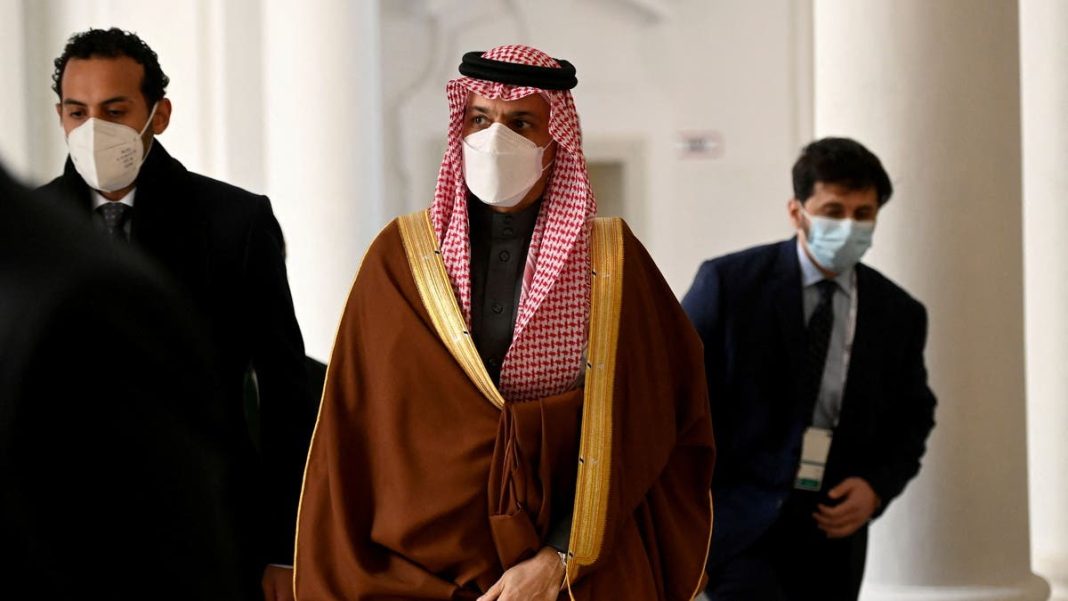The foreign minister stated at the Munich Security Conference that if the 2015 nuclear pact was revived that should be “a starting point, not an endpoint” in order to address regional concerns. Saudi Arabia has been critical of the deal for not tackling Tehran’s missiles programme.
“That will indeed require from our neighbours in Iran a serious desire to address the underlying issues that exist … We hope that there is a serious desire to find a new modus operandi,” he added.
Iran has rejected calls for wider negotiations over its military activities and missile defense program, stressing it would only discuss over its nuclear program with world powers.
“If we see substantive progress on those files, then yes, rapprochement is possible. So far, we have not seen that,” he told the Munich Security Conference.
Iranian Foreign Minister Hossein Amir Abdolahian has recently said Tehran is ready to continue talks with Saudi Arabira, “however this depends above all on Riyadh’s will”.
Earlier this month, Iranian President Ebrahim Raisi said Iran was ready for more talks with Saudi Arabia if Riyadh is willing to hold the talks in an atmosphere of mutual understanding and respect.
“Iran is ready to continue these negotiations until reaching an outcome, provided that the Saudis are willing to continue the negotiations in an atmosphere of mutual understanding and respect,” Raisi added.
Saudi Arabia cut diplomatic ties with Iran in early 2016, after Iranian protesters, angered by the kingdom’s execution of top Shia cleric Sheikh Nimr Baqir al-Nimr, attacked Riyadh’s missions in the country.
Riyadh has since stepped up its belligerent foreign policy toward the Islamic Republic, but the kingdom appears to be ready to change course.
Riyadh and Tehran have announced they hope the talks can ease tensions while playing down expectations of a significant diplomatic breakthrough.
The talks have led to “serious progress” regarding Persian Gulf security, Tehran’s Foreign Ministry Spokesperson Saeed Khatibzadeh stated in September.
In a sign of a thaw in relations, Iran said last month that three Iranian diplomats arrived in Saudi Arabia to take up posts at the headquarters of the Organisation of Islamic Cooperation (OIC) in Jeddah.
The two Middle East heavyweights have specially been at loggerheads over the war on Yemen.
Prince Faisal has claimed Iran continued to provide the Houthis with ballistic missile and drone parts as well as conventional weapons, a charge both Tehran and Yemen’s Houthi group deny.
“This does not contribute to finding a path to settle that conflict, but we are committed and we are supportive of the United Nations representative,” he stated, referring to stalled UN-led efforts for a ceasefire in Yemen.
Iran has repeatedly dismissed allegations about supplying weapons to Yemeni forces.
“Medicine and medical goods are sent to Yemenis with difficulty; then how could military equipment go through and sent to them?” an Iranian foreign ministry spokesperson had asked.
The spokesman noted that the Yemeni nation has made astonishing progress in the military field and manufacturing weapons and military equipment after facing the Saudi-led aggression.
Saudi Arabia and its allies launched a war against the Arab world’s most impoverished nation in March 2015. The war has been seeking to restore power in Yemen to Riyadh’s favorite officials.
The death toll of the war, now in its seventh year, will reach an estimated 377,000 by the end of 2021, according to a recent report from the UN’s Development Programme.
The fighting has seen some 80 percent of the population, or 24 million people, relying on aid and assistance, including 14.3 million who are in acute need.
